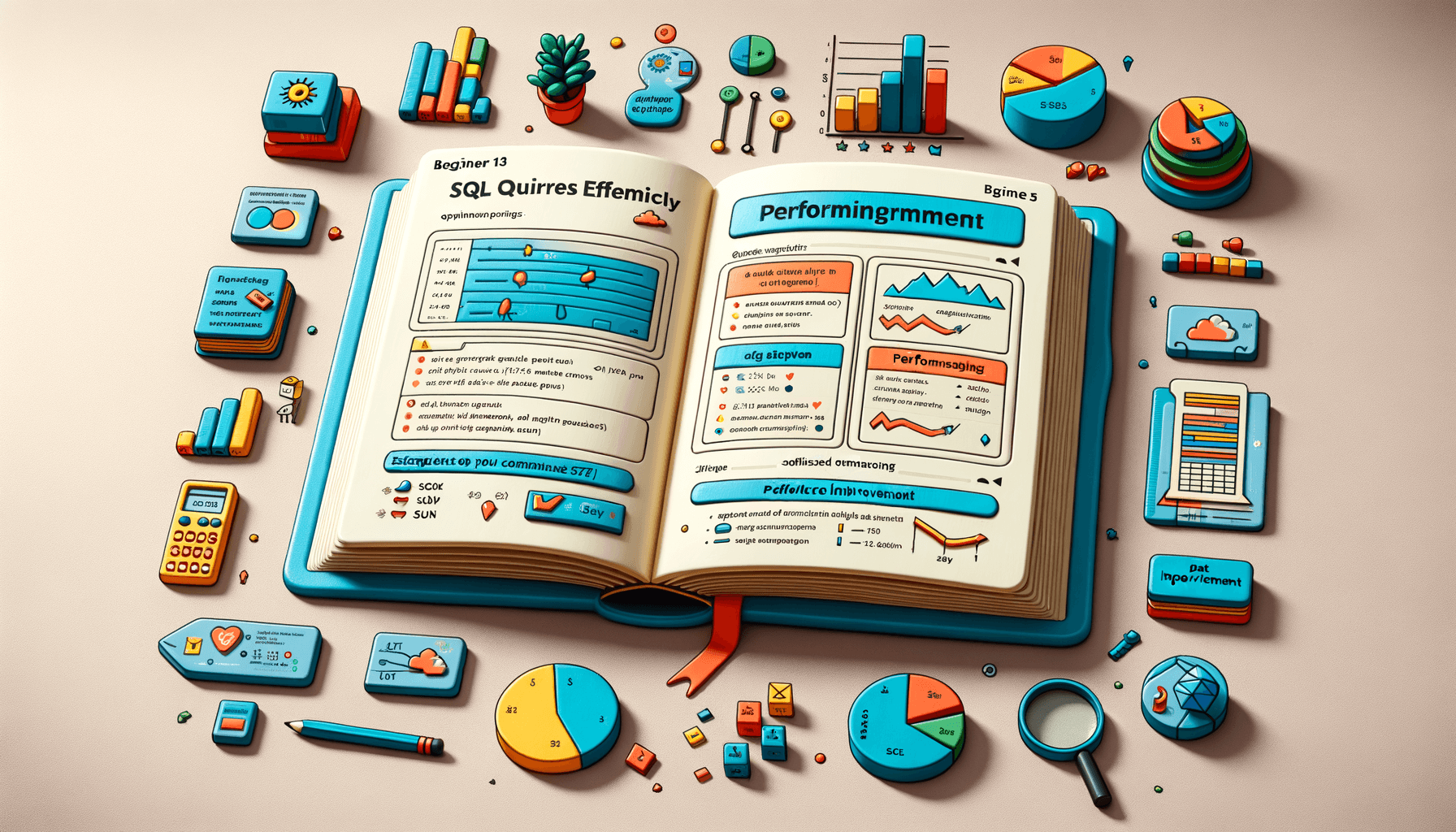A big variety of articles and resources

Mastering Your Career as an SQL Developer: Tips and Strategies
 Sia Author and Instructor
Learn SQL
Sia Author and Instructor
Learn SQL
9 minute read
Mastering your career as an SQL Developer is a rewarding journey filled with opportunities to solve complex problems and work with data that drives business decisions. This article will guide you through essential tips and strategies to excel in this field, from understanding core responsibilities to leveraging advanced techniques and collaborating with cross-functional teams.
Key Takeaways
- Grasp the main duties of an SQL Developer, like database design and data security.
- Learn key skills such as SQL proficiency and scripting for automation.
- Explore advanced SQL techniques to boost your career.
- Adopt effective strategies for career growth, including networking and certifications.
- Understand the importance of teamwork with other professionals.
Understanding the Core Responsibilities of an SQL Developer
Database Design and Modeling
As SQL developers, we need to create and organize databases that store data efficiently. This involves planning the structure of the database and deciding how data will be stored, accessed, and updated. Good database design helps in making sure that the system runs smoothly and can handle large amounts of data.
Query Optimization Techniques
We must also focus on making our queries run as fast as possible. This means writing SQL code that retrieves data quickly and doesn't slow down the system. By using different methods and tools, we can improve the performance of our queries and make the database more efficient.
Data Security and Compliance
Keeping data safe is another key responsibility. We need to make sure that only authorized people can access the data and that it is protected from threats. Additionally, we must follow rules and regulations to ensure that the data is handled properly and legally.
In our role, we balance efficiency with security, ensuring that our databases are both fast and safe to use.
Essential Skills for SQL Developers
Proficiency in SQL and Database Management Systems
To excel as SQL developers, we need to be highly skilled in SQL and familiar with various database management systems (DBMS). Mastering SQL allows us to create, read, update, and delete data efficiently. Understanding different DBMS like MySQL, PostgreSQL, and SQL Server helps us choose the right tool for the job.
Knowledge of Data Warehousing Concepts
Data warehousing is crucial for handling large volumes of data. We should know how to design and manage data warehouses to support business intelligence activities. This includes understanding ETL (Extract, Transform, Load) processes and how to optimize data storage for quick retrieval.
Familiarity with Scripting and Automation
Automation can save us a lot of time and reduce errors. Being familiar with scripting languages like Python or Bash can help us automate repetitive tasks. This skill is essential for maintaining databases and ensuring they run smoothly without constant manual intervention.
Continuous learning and adapting to new technologies are key to staying relevant in the ever-evolving field of SQL development.
Advanced SQL Techniques for Career Growth
Mastering Complex Joins and Subqueries
To excel as SQL developers, we must master complex joins and subqueries. These techniques allow us to retrieve and manipulate data from multiple tables efficiently. Understanding how to use INNER JOIN, LEFT JOIN, and RIGHT JOIN can significantly improve our ability to handle complex queries. Subqueries, or nested queries, enable us to perform operations in a step-by-step manner, making our SQL code more modular and easier to debug.
Implementing Stored Procedures and Functions
Stored procedures and functions are essential for optimizing database performance. By encapsulating frequently used SQL code into stored procedures, we can reduce redundancy and improve maintainability. Functions, on the other hand, allow us to perform calculations and return values within our SQL queries. Both tools are invaluable for creating reusable code and enhancing the efficiency of our database operations.
Utilizing Window Functions for Data Analysis
Window functions are powerful tools for data analysis. They allow us to perform calculations across a set of table rows related to the current row. This is particularly useful for tasks such as ranking, running totals, and moving averages. By leveraging window functions, we can gain deeper insights into our data and perform complex analyses with ease.
Mastering these advanced SQL techniques not only enhances our technical skills but also opens up new opportunities for career growth. By continuously learning and applying these methods, we can stay ahead in the competitive field of SQL development.
Effective Strategies for SQL Developer Career Advancement
Building a Strong Professional Network
To grow in our careers, we need to build a strong professional network. This means connecting with other SQL developers, attending industry events, and joining online forums. Networking can open doors to new job opportunities and collaborations. It also helps us stay updated with the latest trends and technologies in SQL development.
Pursuing Relevant Certifications
Earning certifications can boost our credibility and make us more attractive to employers. Certifications like Microsoft SQL Server, Oracle Database, and mini course: sql query crafting - learn sql queries, data analysis, and career advancement. gain real-world skills with expert-led training for data-driven decision making. can show our expertise and commitment to the field. They also provide us with the chance to learn new skills and stay competitive.
Engaging in Continuous Learning and Development
In the fast-paced world of technology, continuous learning is essential. We should always be looking for ways to improve our skills and knowledge. This can be done through online courses, workshops, and reading industry-related books and articles. Staying curious and proactive in our learning journey will help us stay ahead in our careers.
By focusing on networking, certifications, and continuous learning, we can advance our careers and become successful SQL developers.
Navigating Challenges in SQL Development
Troubleshooting Common SQL Errors
When we face SQL errors, it can be frustrating. Understanding the error messages is the first step to fixing them. We should also check our syntax and logic carefully. Sometimes, a mini course: sql query expansion can help us learn new ways to solve these problems.
Managing Large-Scale Databases
Handling large databases requires special skills. We need to make sure our queries are efficient and our indexes are well-designed. Regular maintenance tasks, like backups and updates, are also crucial. This ensures our data is always available and up-to-date.
Ensuring Data Integrity and Accuracy
Keeping our data accurate is very important. We must use constraints and validations to prevent bad data from entering our systems. Regular audits and checks help us find and fix any issues quickly. This way, we can trust the information in our databases.
In SQL development, facing challenges is part of the job. But with the right strategies and tools, we can overcome them and keep our databases running smoothly.
Leveraging Tools and Technologies for SQL Development
Using Integrated Development Environments (IDEs)
When working as SQL developers, we often rely on Integrated Development Environments (IDEs) to streamline our workflow. These tools offer features like code completion, syntax highlighting, and debugging capabilities. IDEs make it easier to write and manage SQL code efficiently. Popular choices include SQL Server Management Studio (SSMS) and Oracle SQL Developer.
Employing Database Performance Monitoring Tools
To ensure our databases run smoothly, we use performance monitoring tools. These tools help us identify bottlenecks and optimize query performance. By monitoring database health, we can prevent issues before they become critical. Tools like SolarWinds Database Performance Analyzer and Redgate SQL Monitor are commonly used in the industry.
Exploring Cloud-Based Database Solutions
Cloud-based databases offer flexibility and scalability for modern applications. We can leverage services like Amazon RDS, Microsoft Azure SQL Database, and Google Cloud SQL to manage our databases in the cloud. These solutions provide automatic backups, security features, and easy scaling options, making them ideal for growing businesses.
In today's fast-paced tech world, staying updated with the latest tools and technologies is crucial for SQL developers. Embracing these advancements not only enhances our productivity but also ensures we deliver high-quality solutions.
Collaborating with Cross-Functional Teams
Communicating with Business Analysts and Stakeholders
When we work with business analysts and stakeholders, it's important to understand their needs and goals. This helps us design databases that meet their requirements. Clear communication ensures that everyone is on the same page, reducing misunderstandings and errors. We should ask questions and provide updates regularly to keep the project on track.
Working with Software Developers and Engineers
Teaming up with software developers and engineers is crucial for integrating databases with applications. We need to share our knowledge of database design and query optimization to help them build efficient systems. By collaborating closely, we can solve problems faster and create better solutions. It's also helpful to participate in code reviews and offer feedback.
Coordinating with Data Scientists and Analysts
Data scientists and analysts rely on us to provide accurate and well-structured data. We should work together to understand their data needs and ensure that our databases support their analysis. This might involve creating complex joins and subqueries to deliver the right data. Regular meetings and open communication help us stay aligned and meet their expectations.
Effective collaboration with cross-functional teams is key to our success as SQL developers. By working together, we can achieve better results and drive the project forward.
Working with cross-functional teams can be a game-changer for your projects. It brings together diverse skills and perspectives, leading to innovative solutions. Want to learn more about effective collaboration? Visit our website to explore our courses and resources designed to help you succeed in a team environment.
Conclusion
Mastering your career as an SQL developer requires a mix of technical skills, continuous learning, and strategic planning. By focusing on building a strong foundation in SQL, staying updated with the latest industry trends, and honing your problem-solving abilities, you can set yourself apart in this competitive field. Remember, the journey to becoming an expert is ongoing, and embracing new challenges will only make you better. Keep pushing your limits, and you'll find success in your SQL development career.
Frequently Asked Questions
What does an SQL developer do?
An SQL developer designs and manages databases. They write queries to fetch data, optimize database performance, and ensure data security.
What skills are important for an SQL developer?
Key skills include knowing SQL, understanding database systems, and being familiar with data warehousing and scripting.
How can I improve my SQL skills?
Practice writing complex queries, learn about stored procedures, and use window functions for data analysis. Continuous learning is key.
What tools do SQL developers use?
SQL developers use tools like Integrated Development Environments (IDEs), database performance monitoring tools, and cloud-based database solutions.
How can I advance my career as an SQL developer?
Build a strong network, get relevant certifications, and keep learning new skills. Engaging with the community also helps.
What are common challenges SQL developers face?
Common challenges include troubleshooting SQL errors, managing large databases, and ensuring data accuracy and integrity.
Related Articles

A Beginner's Guide to Running a SQL Query Efficiently
8 minute read

Effective Ways to Enhance Your Skills with SQL Practice
9 minute read





